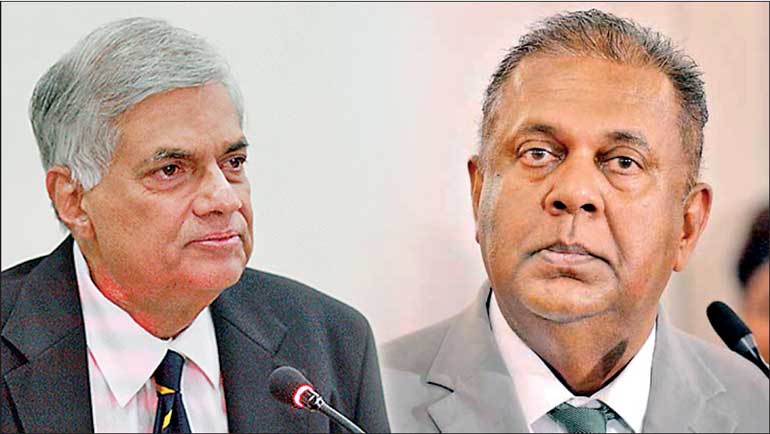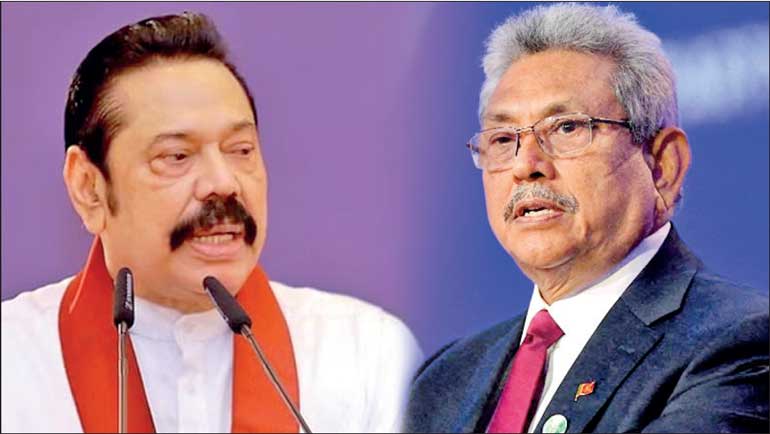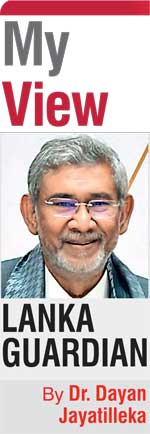Tuesday Feb 17, 2026
Tuesday Feb 17, 2026
Thursday, 19 January 2023 00:30 - - {{hitsCtrl.values.hits}}

President Ranil Wickremesinghe and Mangala Samaraweera

Mahinda Rajapaksa and Gotabaya Rajapaksa
|

Sri Lanka’s soft power, international space and profile began shrinking well before the economic crisis. Had that not been the case, we could have mounted a global campaign for debt relief, strengthening our hand in negotiations. One hopes that a newly elected government and an elected president will do so.
It is sign of Sri Lanka’s external affairs crisis that it has not opened up a combination of Track 2 and global public diplomacy, promoting the call for a debt moratorium signed by almost 182 scholars including prize-winning celebrity economists and a public intellectual ‘rock star’ former finance minister. (Ghosh, Piketty and Varoufakis among 182 experts calling for Sri Lanka debt cancellation - International Debt Charity | Debt Justice (formerly Jubilee Debt Campaign). A (virtual) global conference (co-convened by LK Institute and BCIS) would put public opinion and moral-ethical pressure on private and bilateral creditors to cut a faster, fairer deal with Sri Lanka.
Sanctioned
The Canadian sanctions on the two former (elected) Presidents came reportedly at the insistence of Prime Minister Trudeau’s office. Originally the sanctions had been limited to the two notorious ex-servicemen.
The sanctions are clearly a consequence of the call of successive UN High Commissioners for Human Rights that the member states of the UN initiate action under universal jurisdiction or appropriate legislation; a drastic call eventually endorsed by a majority of the UN Human Rights Council and thereby the Council itself. Prime Minister Ranil Wickremesinghe and Minister Mangala Samaraweera’s co-sponsorship of the 2015 UNHRC resolution (the latter said it was initiated and drafted locally, under Ranil’s leadership) which welcomed the Report of UN Human Rights High Commissioner Zeid al-Hussein alleging systemic crimes (not merely individual ones) and containing that call, helped seal Sri Lanka in.
During the war and in its aftermath, with the blood still drying on the battlefield in May 2009, the charges of war crimes and crimes against humanity and the call for international prosecution or sanctions of Sri Lankans made in Geneva, were decisively rebuffed by the Council, denying a UN mandate for such action.
The devaluation of foreign policy and external relations during the second term of Mahinda Rajapaksa was best evidenced by the appointment of the unlettered Sajin Vass Gunawardena as the Presidential Advisor on International Relations, a post once held by distinguished senior civil servant Bradman Weerakoon.
Now the chickens (or Canadian geese) are coming home to roost.
Postwar deterioration
|
|
|
Lakshman Kadirgamar
|
Successive postwar administrations have veered between on the one hand, chronic over-dependence on China and have experienced erosion of the broad support enjoyed by Sri Lanka at the UN Geneva in 2009, and on the other hand, overreliance on the West at the cost of a sufficiency of domestic support.
Sri Lanka had the clear option of building upon the demonstrable international support it had in Geneva at the end of the war, to improve relations with the West. The opportunity presented itself with the Kerry-Lugar report of the US Senate’s Foreign Relations Committee in late 2009. I was with President Mahinda Rajapaksa in Hanoi when a sneak preview of the report came in and was discussed with members of the delegation accompanying him (that included a lunchtime one-on-one with me). He rightly regarded the report as on balance, positive.
However, when he phoned Presidential Secretary Lalith Weeratunga in Colombo, he was assured that a group, including academics, was being convened to evaluate and respond appropriately. What that actually amounted to was the hawks in Colombo which included the Secretary/Defence Gotabaya Rajapaksa and political manager Basil Rajapaksa, together with the hardliners in the military, blocking any breakthrough. This was because the US Senate Foreign Relations committee report laid down a clear marker for the qualitative improvement in US-SL relations: devolution in the specific form of the implementation of the 13th amendment.
The Kerry-Lugar report, soft on accountability, flagged the lowest price that Sri Lanka would ever have to pay for improvement of relations with the USA. But that went contrary to the mood of the hawks who had begun to dominate the postwar Rajapaksa administration.
I was struck during the state visit to Vietnam, that the Sri Lankan side did not once ask Vietnam how it handled the problems of the rehabilitation of enemy fighters. Nor did it ask Vietnam about the larger problems of the transition from 30 years of terrible wars to peace and conspicuous economic prosperity (Japanese companies were ubiquitous in Ho Chi Minh City). This was especially unfortunate because the Presidents of Vietnam and Sri Lanka confirmed in their conversation that due to the special relationship in wartime in helping neutralise LTTE networks in Southeast Asia, Vietnam was the first country to which Sri Lanka confirmed the victorious end of the war. And yet, we didn’t ask how they made their transition to a prosperous, secure peace.
Instead, the Sri Lankan delegation announced that “Sri Lanka was open for business” and played the new card that the hawks in the system had come up with: the untenable idea of a Buddhist bloc of states. For Vietnam, and indeed China, Buddhism was a cultural soft power resource, not a decisive factor, still less a criterion, in international political (state-to-state) relations.
After Mahinda Rajapaksa’s needlessly tragic second term and before Gotabaya Rajapaksa’s surreal spell as President, came the Yahapalanaya administration in which the portfolios of Finance and Foreign Affairs were held by the UNP of Prime Minister Ranil Wickremesinghe. Ranil’s and Mangala Samaraweera’s foreign policy orientation was so West-centric that he didn’t keep India (still less India and China) in the loop about his UNHRC resolution of 2015 which he co-sponsored with the West. India was not a signatory.
Worse still, it triggered a domestic majoritarian-nationalist blowback that split the bipartisan coalition undergirding the so-called ‘hybrid’ government of 2015 and finally fed into the Gotabaya Rajapaksa candidacy and presidency as well as the SLPP landslide of 2020.
Then came the Gotabaya presidency, in which we lost considerable space internationally, rejecting Japan in favour of unsolicited hyper-dependence on China, followed by clumsy juggling of India and China while proclaiming “neutrality”.
Policy deviations and disorientation
Two cliches currently compete. One is that our foreign policy must be driven by our markets: our markets are in the West, so our foreign policy must be west-oriented if not west-centric.
The fact, however, is that Vietnam’s markets are in the West but it did not abstain, still less vote for, but actually voted against the recent resolution at the UN that Russia should pay reparations for its incursion into Ukraine. Sri Lanka should not have done the same, but it goes to show that Vietnam, an economic star, has always been a mature international player which knows that foreign policy is not simply or primarily a question of going for the money. Markets change, but a state has far more abiding geopolitical interests and relationships.
The other, opposing cliché, is that Sri Lanka is with the global South, the Nonaligned. If that were actually the case, the SLPP and the Rajapaksa-led SLFP would have examined why, postwar, it was losing the votes of the global south which had supported Sri Lanka solidly in Geneva in wartime and the immediate aftermath of the military victory in May 2009.
The Americans say, “if it ain’t broke, don’t fix it”. As the UN vote in May 2009 demonstrated, our foreign policy wasn’t broke, but three postwar Sri Lankan governments absurdly went ahead and tried to fix it, with disastrous consequences.
The Rajapaksas shifted ideologically from our wartime multipolar balancing and multilateralism to postwar unilateralism; from solidarity with and solidarity of the global south, to a caricature of the policy of Netanyahu’s Israel and (later) Trump’s America. It was Basil and Gotabaya Rajapaksa and their hangers-on who shattered the wartime coalition built up in Geneva.
Sri Lankan delegates began to sound ridiculously like the Israelis and treated Mahinda Rajapaksa’s wartime pledge to implement the 13th amendment and address accountability concerns in the same manner that Netanyahu’s diplomats treated the Oslo accords and its two-state solution. That lost us the support of India, a pivotal state, the BRICS and much of Latin America. Instead of the commitment to multipolarity that served and protected Sri Lanka, we slid to a position of splendid isolation, secure in the belief that our civilisational heritage and military victory placed us in a position of innate moral superiority and invulnerability. The Sinhala hardliners thought this affordable because in their deluded unipolar worldview, China would play the role for Sri Lanka that the US played for Israel.
The Sinhala majoritarian militarists who influenced policy under the Rajapaksas and are still ensconced in the system, forgot that no quadrant of the world—North, South, East or West—was oblivious to the Tamil question; the question of a devolution-based postwar settlement for the Tamil people. What should have been good news for any intelligent Sinhala nationalism was that every country would be satisfied with a formula that satisfied India, and that formula as expressed in several UNHRC resolutions, was the implementation of what was already in the Constitution, however it got there: the 13th amendment.
However, for the Sinhala maximalists (maximum centralisation) and the Tamil maximalists (maximum federalisation) that was and remains bad news.
The UNP of Ranil Wickremesinghe swung to the opposite extreme. That was to go much further than the 13th amendment, needlessly beyond what India and UNHRC resolutions sought, to a new, non-unitary Constitution. Ranil-Mangala committed to accountability with foreign judges and prosecutors.
The unitary state form and domestically-driven (though internationally credible) accountability are red lines that cannot be crossed without unacceptable national costs, just as the 13th amendment is the red line that cannot be deleted without unacceptable international ones.
Foreign policy fundamentals and framework
Our foreign policy must be centred on our vital national interests. These interests include but certainly do not derive from anything as tactical as our export markets. Our national interests derive from our existential geopolitical and geostrategic realities: “who we are, what we are, where we are” as my father Mervyn de Silva used to say. Bradman Weerakoon has written of Mervyn’s “pervasive” influence on foreign policy. (From SWRD to Premadasa: Mervyn de Silva’s role in defining foreign policy for a half-century | Daily FT.)
The fundamental objectives of foreign policy should be (a) to safeguard with the greatest sagacity, our core national interests which are the independence, sovereignty, unity and territorial integrity of Sri Lanka as a state, and (b) to maximise its strategic autonomy as a state. This requires an understanding not only of the country’s abiding geo-political and geo-strategic realities but also of the swirling complex currents of our present time in history, in the region, in Asia and the world, especially those which may constitute threats and challenges to Sri Lanka’s core national interests.
There is a half-humorous line in Vietnam, that with China as its permanent neighbour, the world’s most populous country with which it has had a long, complex history, anyone who is chosen to lead Vietnam must have the twin ability to be best friends of China and also to stand up to China: “be best friends with China even while standing up to China”. I’d say the same goes for Sri Lanka and India, and given our half a millennium of colonial history, Sri Lanka and any Great Power especially at this time of intense and intensifying Great Power proxy wars in the West and rivalry and competition in the East.
A pragmatic Sri Lankan foreign policy must consist of concentric circles radiating from the abiding realities of our location and therefore our identities: South Asia, Asia, global South. This does not mean wishing away the Indo-Pacific, within which we are also located-- but that is a more recent and contestable strategic construct (some prefer ‘Asia-Pacific’).
Nor does the recognition of our identity as a member of the global South mean adopting an old ‘Third Worldist’ foreign policy. Rather it means being securely anchored in our sense of belonging to the global South, with its shared interests and perspectives of a multipolar world order, while adopting what General Charles de Gaulle called a policy of ‘tous azimuths’ (all points of the compass) and iconic Russian foreign minister and intellectual Yevgeny Primakov termed a ‘multi vector’ policy.
Zanny Minton Beddoes, the editor-in-chief of The Economist (London) admits in the prestigious periodical’s survey The World Ahead 2023 that the West’s policy towards Russia over Ukraine “…has widened the gap between the West and the rest. The majority of people in the world live in countries that do not support Western sanctions on Russia.” (Why a global recession is inevitable in 2023 | The Economist)
It is in this new ‘intermediate zone’ which consists of the global majority, the zone of ‘the new Nonalignment’ (as India’s former foreign secretary Shivashankar Menon defined it), that Sri Lanka belongs.
Kadirgamar concept
The Gotabaya-Basil and Ranil-Mangala conceptions of foreign policy an overlap and were on a continuum. Both (a) opposed and ignored the LLRC and Desmond de Silva QC roadmaps on domestically-driven accountability and (b) ruptured with the foreign policy framework and practice of Lakshman Kadirgamar, our finest foreign minister.
The Kadirgamar paradigm is best envisioned as a six-sided framework:
1) A strong sense of national sovereignty and robust defence of the state; opposition to intervention and interference (LK’s critique of the Ceasefire Agreement and PTOMS).
2) Commitment to international law especially in human rights.
3) A non-tribalist Sri Lankan identity; an autonomy-based political solution to the Tamil question.
4) A truly global, all-round outreach, dialogue and friendship (e.g., Colin Powell was a friend).
5) An Eastern (India-China-East Asia) orientation.
6) An intellectual-conceptual dimension (e.g., the LKI, his BCIS journal International Relations in a Globalizing World).
Kadirgamar whose specialisation was international law and intellectual property rights, was inducted in the early 1990s into international relations and foreign policy as such through the Foreign Affairs Study Group (FASG) chaired by Dr. Gamani Corea with Mervyn de Silva as Secretary-General, by the latter, his university friend.
LK’s closest co-thinker, an outstanding Sri Lankan who also combined sovereignty, a global southern perspective, multi-cultural universality and human rights, was Justice CG Weeramantry.
I was closely acquainted with Foreign Minister Lakshman Kadirgamar’s thinking. He inducted me onto the Board of the Bandaranaike Center for International Studies, placed me with his visiting friend Sir Adam Roberts of Oxford on a panel on ‘Foreign Policy Challenges for Sri Lanka in the 21st Century’, and commissioned Aruni Wijewardena and me with co-drafting the founding document of the Sri Lanka Institute of International Relations and Strategic Studies (now the Lakshman Kadirgamar Institute) for presentation to the International Institute of Strategic Studies (IISS), London.
Basically, what the Gotabaya-Basil and Ranil-Mangala foreign policy perspectives shared was the aversion to the Lakshman Kadirgamar paradigm, which alone could have saved and served Sri Lanka as a compass today and may yet do so.